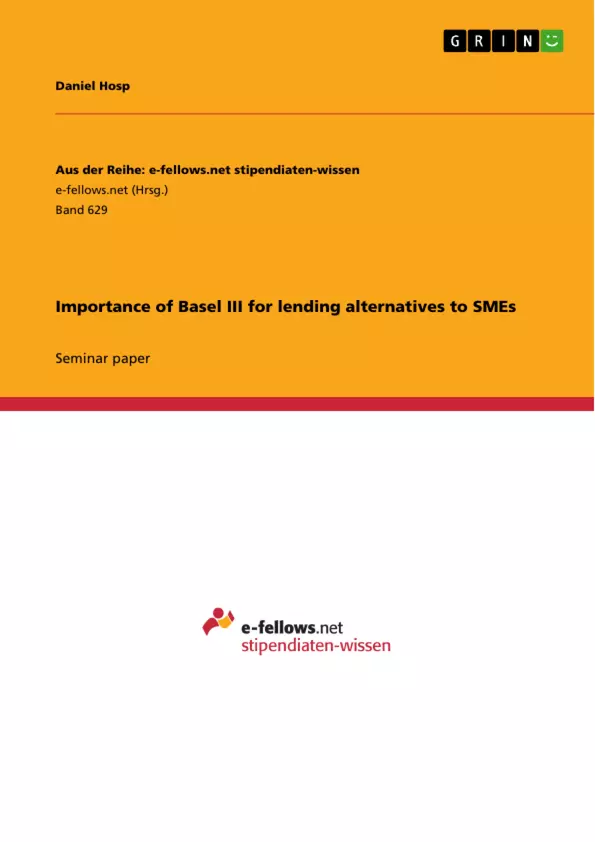Basel III is currently on everyone’s lips. Some weeks before the introduction of the first requirements it is still not fully clear how and which parts of it will be implemented. Several studies about the impact of Basel III on bank loan availability for small and medium sized companies (SMEs ) do exist (e.g. McKinsey (2010)) which have shown that the introduction of those new regulatory requirements hamper the access for SMEs to sufficient sources of funding. This raises the question if these restrictions for bank lending can be substituted by some alternative funding source or if the availability of external finance to SMEs will be constrained under Basel III. This seminar paper focuses on the lending alternatives apart from bank loans and the possibility of gathering additional equity capital. This is basically the so called asset based finance. Thereby the paper concentrates on European SMEs as long as their conditions are quite similar to those of Austrian SMEs and the introduction of Basel III can be expected to be most strict for European financial institution and thus may hit those SMEs the most.
Before starting with the explanation of different lending alternatives the importance of SMEs for the global economy should be pointed out. The importance is especially present in Europe. SMEs account for two third of the total employment in the EU-27 area and they generated more economic growth from 2002 to 2008 than large firms did (Oxford Economics, 2011). Moreover they represent 99% of all businesses that exist in Europe (European Commission, 2005). So SMEs are the main driver of economic growth, employment and wealth in Europe. Apart from that each single SME does not have a systematic risk and they were also not responsible for the current financial crisis. Thus SMEs should generally be supported to sustain growth and employment. Nevertheless the rules of Basel III may have highly negative influences on their financing possibilities which moreover has a negative effect on the real economy...
Inhaltsverzeichnis (Table of Contents)
- Introduction
- Lending Alternatives
- Leasing
- Factoring
- SME-Bonds
- Asset-Backed-Securities
- The Importance of Basel III for Lending Alternatives to SMEs
- A short introduction to Basel III
- How Basel III may influence Leasing and Factoring
- Access of SMEs to Finance
- Riskiness of the Leasing and Factoring Business
- Conclusion and Prospect for the Leasing and Factoring Business
Zielsetzung und Themenschwerpunkte (Objectives and Key Themes)
This seminar paper explores the significance of Basel III regulations on lending alternatives for small and medium-sized enterprises (SMEs). It investigates how these regulations might impact the availability and accessibility of funding options for SMEs, focusing specifically on leasing and factoring as viable alternatives to traditional bank loans.
- The impact of Basel III on SME financing
- The role of lending alternatives for SMEs
- The specific influence of Basel III on leasing and factoring
- The access of SMEs to finance in the context of Basel III
- The risk profiles of leasing and factoring businesses under Basel III regulations
Zusammenfassung der Kapitel (Chapter Summaries)
The paper begins by introducing the concept of Basel III and its potential impact on SME financing, highlighting concerns regarding restricted bank loan access. It then delves into the importance of SMEs for the European economy, emphasizing their role as key drivers of growth, employment, and wealth creation.
Chapter 2 focuses on lending alternatives to bank loans, with a particular emphasis on leasing. The chapter explores the mechanics of leasing and its benefits for SMEs, including improved balance sheet ratings, lower leverage ratios, and reduced risk associated with asset value fluctuations.
Schlüsselwörter (Keywords)
The main keywords and focus topics of the text include Basel III, lending alternatives, SMEs, leasing, factoring, asset-based finance, European economy, risk assessment, and financial regulation.
Frequently Asked Questions
How does Basel III affect SME lending?
Basel III introduces stricter regulatory requirements for banks, which can hamper the access of small and medium-sized enterprises (SMEs) to traditional bank loans.
What are the alternatives to traditional bank loans for SMEs?
Viable alternatives include asset-based finance options such as leasing, factoring, SME bonds, and asset-backed securities.
What are the benefits of leasing for an SME?
Leasing can improve balance sheet ratings, lower leverage ratios, and reduce the risk associated with asset value fluctuations.
Why are SMEs so important for the European economy?
SMEs represent 99% of all businesses in Europe and account for two-thirds of total employment, acting as the main driver of economic growth.
What is "Factoring"?
Factoring is a financial transaction where a business sells its accounts receivable (invoices) to a third party at a discount to get immediate cash flow.
- Quote paper
- BSc Daniel Hosp (Author), 2012, Importance of Basel III for lending alternatives to SMEs, Munich, GRIN Verlag, https://www.grin.com/document/209079



